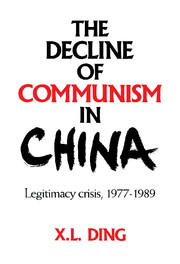Book contents
- Frontmatter
- Contents
- List of tables and figure
- Preface
- List of abbreviations
- Introduction
- Part I
- Part II
- 3 The movement to “emancipate the mind” and the counterelite's response
- 4 “Building socialist spiritual civilization” and the counterelite's response
- 5 Two contending patriotic campaigns
- 6 Admission of the “primary stage of socialism” and the counterelite's two developmental models
- Concluding remarks
- Appendix: Notes on methods and methodology
- Selected bibliography
- Index
3 - The movement to “emancipate the mind” and the counterelite's response
Published online by Cambridge University Press: 17 September 2009
- Frontmatter
- Contents
- List of tables and figure
- Preface
- List of abbreviations
- Introduction
- Part I
- Part II
- 3 The movement to “emancipate the mind” and the counterelite's response
- 4 “Building socialist spiritual civilization” and the counterelite's response
- 5 Two contending patriotic campaigns
- 6 Admission of the “primary stage of socialism” and the counterelite's two developmental models
- Concluding remarks
- Appendix: Notes on methods and methodology
- Selected bibliography
- Index
Summary
The preceding chapter deals with the question of how it was possible for the counterelite of post-Mao China to voice its criticism of the Communist regime. The rest of this work will answer the question of what criticism the counterelite expressed during the late 1970s to late 1980s. Having surveyed the institutional basis of opposition and paraopposition in post-Mao China, we can now turn to the major events that symbolized the conflict between the ruling elite and the counterelite. My analysis begins with the ruling elite's appeal to rationalism and the counterelite's response, which formed much of the background against which the political drama of Dengist China developed.
Background: obstacles to Deng's advance and to his four objectives
Late in 1974, when China's premier Zhou Enlai was hospitalized for an incurable cancer, Deng Xiaoping, an early victim of the Cultural Revolution, was appointed by party Chairman Mao Zedong as vice-premier for day-to-day administration of state affairs. After taking over this key post, Deng began to push bureaucrats to make systematic adjustments to correct the disastrous consequences of the Cultural Revolution. This move disappointed and enraged Mao, who regarded the Cultural Revolution as his last political masterwork. The aging chairman put his remaining energy into a “Criticize Deng Campaign” and early in 1976 replaced Deng with Hua Guofeng, a Politburo member in charge of the police.
- Type
- Chapter
- Information
- The Decline of Communism in ChinaLegitimacy Crisis, 1977–1989, pp. 83 - 113Publisher: Cambridge University PressPrint publication year: 1994



